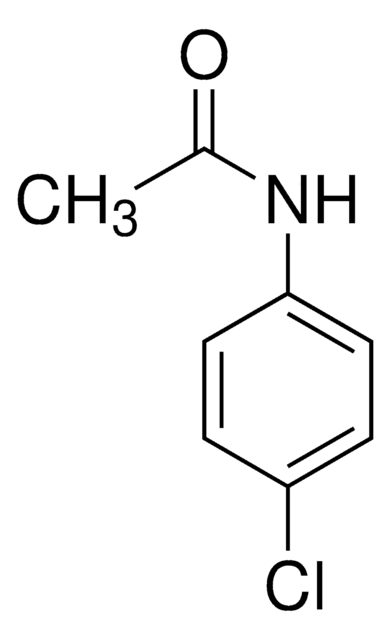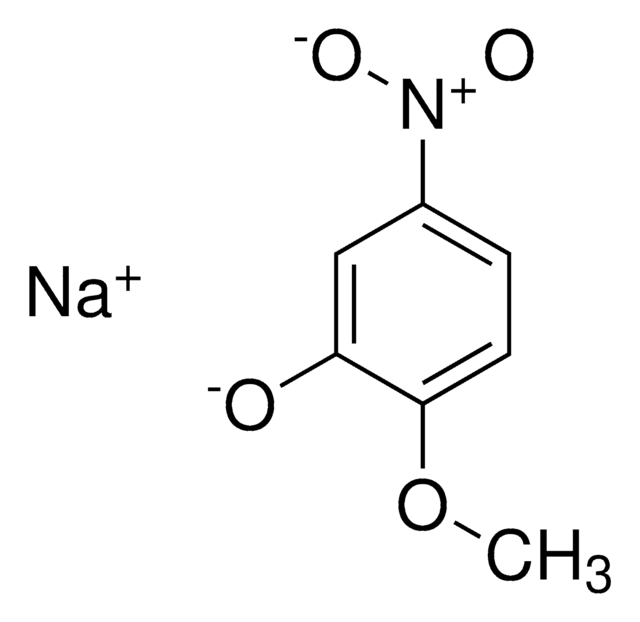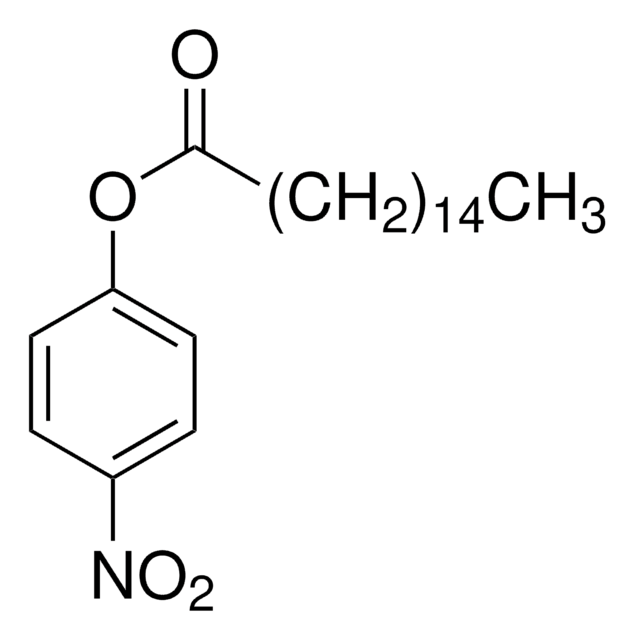35836
4-Nitrophenol
PESTANAL®, analytical standard
Synonym(e):
p-Nitrophenol
About This Item
Empfohlene Produkte
Qualität
analytical standard
Qualitätsniveau
Dampfdruck
0.6 mmHg ( 120 °C)
Produktlinie
PESTANAL®
Assay
100% (HPLC)
Selbstzündungstemp.
541 °F
Haltbarkeit
limited shelf life, expiry date on the label
Methode(n)
HPLC: suitable
gas chromatography (GC): suitable
bp
279 °C (lit.)
mp (Schmelzpunkt)
110-115 °C (lit.)
Anwendung(en)
agriculture
environmental
Format
neat
SMILES String
O=N(C1=CC=C(O)C=C1)=O
InChI
1S/C6H5NO3/c8-6-3-1-5(2-4-6)7(9)10/h1-4,8H
InChIKey
BTJIUGUIPKRLHP-UHFFFAOYSA-N
Suchen Sie nach ähnlichen Produkten? Aufrufen Leitfaden zum Produktvergleich
Verwandte Kategorien
Anwendung
Rechtliche Hinweise
Signalwort
Warning
H-Sätze
Gefahreneinstufungen
Acute Tox. 4 Dermal - Acute Tox. 4 Inhalation - Acute Tox. 4 Oral - STOT RE 2 - STOT RE 2 Oral
Zielorgane
Kidney,Liver
Lagerklassenschlüssel
6.1C - Combustible acute toxic Cat.3 / toxic compounds or compounds which causing chronic effects
WGK
WGK 2
Flammpunkt (°F)
336.2 °F
Flammpunkt (°C)
169 °C
Persönliche Schutzausrüstung
dust mask type N95 (US), Eyeshields, Faceshields, Gloves
Hier finden Sie alle aktuellen Versionen:
Besitzen Sie dieses Produkt bereits?
In der Dokumentenbibliothek finden Sie die Dokumentation zu den Produkten, die Sie kürzlich erworben haben.
Kunden haben sich ebenfalls angesehen
Artikel
Separation of 2-Chlorophenol; 2,4-Dichlorophenol; 2,4,6-Tribromophenol; 2,4,6-Trichlorophenol; 2,4-Dinitrophenol; Pentafluorophenol; 2-Methylphenol, analytical standard; 2,3,4,6-Tetrachlorophenol; Pentachlorophenol; 4-Nitrophenol; 2-Bromophenol; 2,3,5,6-Tetrachlorophenol; 2,3,5-Trichlorophenol; 4-Chloro-3-methylphenol; 2,4,5-Trichlorophenol; 4-Methylphenol, analytical standard; 2,4-Dimethylphenol; 2-Nitrophenol; 3-Methylphenol, analytical standard; Phenol; 2-Methyl-4,6-dinitrophenol; 2,3,4-Trichlorophenol; 2,6-Dichlorophenol; 2,3,4,5-Tetrachlorophenol
Protokolle
Separation of 2-Nitrophenol; Pentachlorophenol; 2-Bromophenol; Phenol; 4-Nitrophenol; 3-Methylphenol, analytical standard; 4-Chloro-3-methylphenol; 2,4-Dichlorophenol; 2,3,4,6-Tetrachlorophenol; 2-Methylphenol, analytical standard; 2,4,6-Trichlorophenol; 2,4-Dimethylphenol; 2-Chlorophenol
HPLC Analysis of Phenols on SUPELCOSIL™ LC-8
Unser Team von Wissenschaftlern verfügt über Erfahrung in allen Forschungsbereichen einschließlich Life Science, Materialwissenschaften, chemischer Synthese, Chromatographie, Analytik und vielen mehr..
Setzen Sie sich mit dem technischen Dienst in Verbindung.







